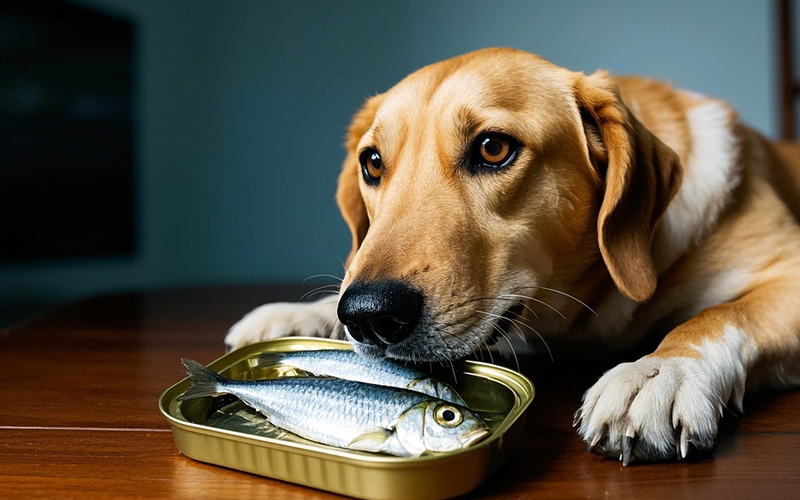Can Dogs Eat Canned Sardines? The Truth You Need to Know
- 25 Mar 2025 10:56
Sardines are a popular fish for humans due to their rich nutrient profile, but if you’re wondering whether they’re safe for your dog, the answer is yes, canned sardines can be a healthy treat for dogs—with some important considerations. While they offer several nutritional benefits, there are a few factors to keep in mind to ensure your dog enjoys them safely.

The Benefits of Canned Sardines for Dogs
High in Omega-3 Fatty Acids
Sardines are packed with omega-3 fatty acids, which are essential for heart health, joint health, and skin and coat condition. Omega-3s also have anti-inflammatory properties, which can benefit dogs with arthritis or other inflammatory conditions. These fatty acids are especially great for older dogs or those with sensitive skin. 🐾💪Rich in Protein
Sardines are an excellent source of protein, which is vital for maintaining your dog’s muscle mass, energy levels, and overall health. Protein also plays a role in tissue repair and the immune system, making it an important part of your dog’s diet. 🦴Packed with Nutrients
Canned sardines are rich in several key nutrients, including vitamin B12, vitamin D, calcium, and selenium. These vitamins and minerals support your dog’s bone health, immune function, and overall vitality. Sardines can also be beneficial for dental health, as the calcium in them can help maintain strong teeth. 🦷
The Risks of Canned Sardines for Dogs
While canned sardines can be a healthy treat for dogs, there are a few potential risks you should be aware of:
High in Sodium
Many canned sardines are packed in oil and contain added salt to preserve the fish. Excessive sodium can be harmful to dogs, potentially causing salt toxicity, which can lead to vomiting, diarrhea, excessive thirst, and even more serious issues like kidney damage. Always check the label and choose low-sodium or no-salt-added varieties to minimize this risk. 🧂Canned in Oil
Canned sardines are often packed in oil, which adds extra fat and calories. While a small amount of healthy fats is good for dogs, too much oil can lead to weight gain and may cause digestive upset. If you opt for canned sardines, look for those packed in water instead of oil, or drain the oil before serving them to your dog. 🌊Bones
Sardines, like most fish, contain small bones. However, these bones are usually soft enough to be eaten safely, and they can provide an additional source of calcium. Still, it’s essential to ensure the sardines are properly mashed or that you supervise your dog to avoid any choking hazard, especially if your dog is smaller or tends to gulp food quickly. 🦴
How to Safely Serve Canned Sardines to Your Dog
If you want to feed your dog canned sardines, follow these tips to ensure it’s safe:
Choose the Right Type
Always choose canned sardines packed in water with no added salt. Avoid sardines packed in oil or those that are heavily seasoned. If you can’t find low-sodium options, consider draining the oil and rinsing the sardines before serving them to your dog.Serve in Moderation
While sardines are healthy, they should be fed in moderation. Due to their rich nutrient profile, sardines are best used as an occasional treat rather than a regular part of your dog’s diet. A small amount (one or two sardines for a medium-sized dog) once or twice a week is plenty.Remove Excess Oil
If you choose sardines packed in oil, be sure to drain the oil or serve the sardines without the liquid. Excessive fat from oil can upset your dog’s stomach and contribute to weight gain.Break Up the Sardines
If your dog is small or tends to swallow food whole, consider breaking the sardines into smaller pieces to reduce the risk of choking or digestive issues. You can also mash them up and mix them with their regular food for a special treat.
What to Do If Your Dog Eats Too Many Sardines
If your dog eats too many sardines, watch for signs of digestive upset, such as:
Vomiting 🤢
Diarrhea 💩
Excessive thirst or urination 🐾
If you notice any of these symptoms, or if you suspect your dog has eaten a large amount of sardines (especially with oil or salt), contact a pet health professional. For immediate advice, you can use PettureX for a 24-hour online consultation. 📱
The Bottom Line: Can Dogs Eat Canned Sardines?
Yes, canned sardines can be a healthy treat for dogs when served in moderation and prepared properly. Sardines offer many health benefits, such as omega-3 fatty acids, protein, and important vitamins and minerals. However, it’s essential to choose low-sodium, no-oil options and to avoid any sardines that are heavily seasoned with garlic or onion (which are toxic to dogs). Serving sardines in moderation can support your dog’s heart health, skin condition, and overall well-being.
For peace of mind, you can always consult with a pet health professional through PettureX, which offers 24-hour online consultations and expert guidance on pet health! 🌟
Related

Why is Regular Dog Grooming So Important?
- 21 Jun 2025
Can Dogs Eat Kiwis? A Vet-Approved Guide to This Fuzzy Fruit
- 10 Jun 2025
Can Dogs Eat Curry? Unpacking Risks, Benefits, and Safe Alternatives for Your Canine Companion
- 3 Jun 2025
Can Dogs Eat Cooked Carrots? A Crunchy & Colorful Canine Query!
- 29 May 2025
Can Dogs Eat Cooked Cabbage? Unveiling the Crunchy Truth for Your Canine!
- 29 May 2025
Can Dogs Eat Citrus? Peeling Back the Zesty Truth for Your Pup!
- 28 May 2025
Can Dogs Eat Cinnamon Applesauce (A Little Bit)? The Sweet and Spicy Truth!
- 28 May 2025
Can Dogs Eat Chorizo? Sizzling a Warning for Your Furry Friend!
- 27 May 2025
Can Dogs Eat Chili? A Spicy Topic for Canine Consumption!
- 27 May 2025
Can Dogs Eat Raw Chicken? Unveiling the Risks and Realities
- 26 May 2025
